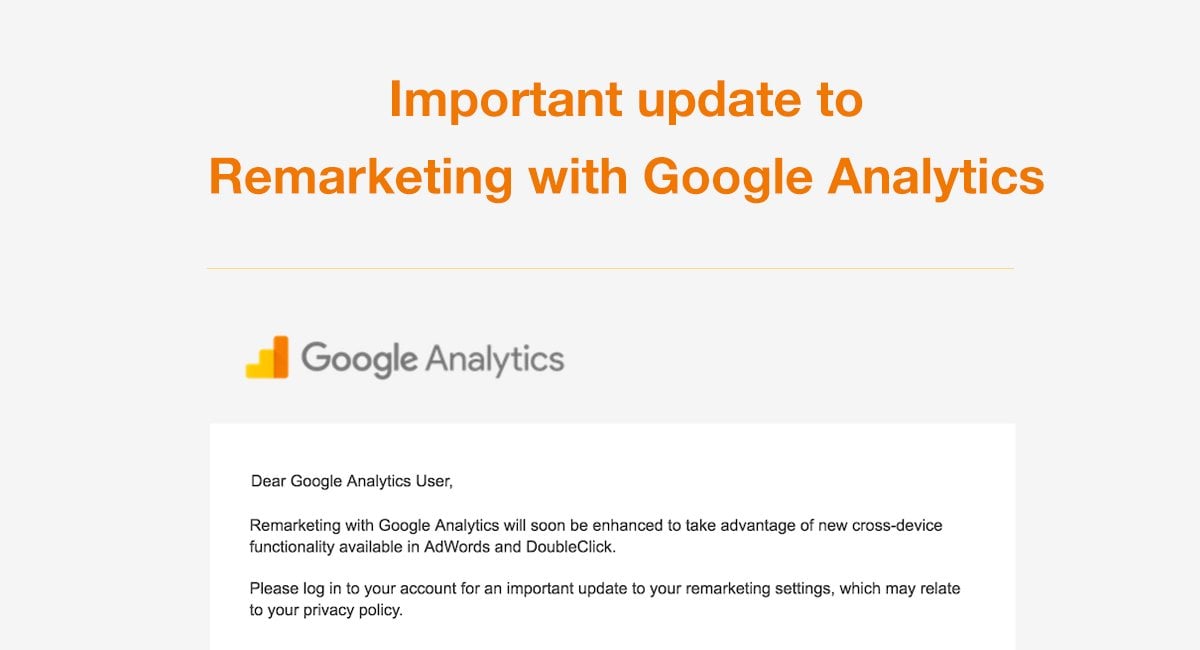Harnessing Remarketing in Google Analytics: A Comprehensive Guide
Utilizing remarketing in Google Analytics offers businesses a calculated side in reaching out to prospective consumers. The ability to target individuals that have currently connected with your site presents an unique possibility for customized advertising and marketing initiatives. By comprehending just how to craft target market listings and deploy them properly, services can considerably improve their conversion rates. However, the details of setting up and enhancing remarketing campaigns call for a thorough understanding of target market division and performance evaluation. This overview will clarify the vital actions associated with using the complete capacity of remarketing in Google Analytics, leading to boosted marketing end results.
Comprehending Remarketing in Google Analytics
Remarketing in Google Analytics permits organizations to tactically target users who have actually formerly interacted with their website or mobile app. By leveraging data from Google Analytics, organizations can produce customized remarketing checklists based on customer behavior, such as web pages visited, activities taken, or details goals accomplished. This effective device enables businesses to re-engage with users that have actually revealed passion in their solutions or items, ultimately raising the likelihood of conversion.
Recognizing the different sorts of remarketing approaches is essential for an effective campaign - What Is “Remarketing” In Google Analytics?. Google Analytics offers numerous alternatives, including standard remarketing, dynamic remarketing, and remarketing listings for search ads (RLSA) Each type serves an one-of-a-kind purpose and can be customized to meet particular advertising purposes
Moreover, assessing the efficiency of remarketing campaigns is essential for optimizing results. Google Analytics offers beneficial understandings into the effectiveness of different remarketing approaches, allowing businesses to make data-driven choices and improve their targeting technique. By continuously monitoring and readjusting remarketing initiatives based on analytics information, businesses can make best use of ROI and drive success in their advertising initiatives.
Setting Up Remarketing Projects

After establishing audience listings, the next action is to connect Google Analytics with Google Ads. By linking these 2 systems, services can perfectly move target market listings from Google Analytics to Google Ads for remarketing functions. This assimilation enables more exact targeting and much better campaign efficiency.
When the accounts are connected, companies can develop remarketing campaigns in Google Ads using the target market details formerly specified in Google Analytics. These projects can be personalized with details advertisement creatives, messaging, and bidding strategies to successfully re-engage with previous site visitors and drive conversions. By complying with these steps, businesses can leverage the power of remarketing to improve their advertising initiatives and increase ROI.
Utilizing Target Market Segmentation Methods

Predefined sections in Google Analytics permit you to quickly analyze common audience groups like new customers, returning users, or users that completed a particular goal on your internet site. Custom segments, on the other hand, enable you to develop unique segments based on specific criteria that are very important to your organization goals. Dynamic remarketing lists immediately change based upon customer actions, revealing personalized ads to customers who have connected with Get More Information your website specifically means.
Analyzing Remarketing Efficiency Metrics
Upon examining the performance of remarketing campaigns in Google Analytics, the evaluation of vital performance metrics supplies important insights into audience engagement and conversion rates. By delving into metrics such as click-through rates (CTR), conversion rates, price per purchase (CERTIFIED PUBLIC ACCOUNTANT), and return on ad invest (ROAS), marketing professionals can determine the weblink success of their remarketing initiatives. Examining these metrics allows marketing professionals to enhance projects, fine-tune audience targeting, and allocate spending plans successfully to enhance total remarketing efficiency.
Optimizing Remarketing Techniques
When refining remarketing techniques in Google Analytics, concentrating on audience division is paramount for attaining project success. By separating your target market right into details sectors based upon their habits, demographics, or rate of interests, you can tailor your advertisements better to every team. This targeted approach enhances the possibility of engaging individuals who have already shown rate of interest in your services or products, causing higher conversion rates.
An additional critical element of optimizing remarketing methods is constantly testing and refining your projects (What Is “Remarketing” In Google Analytics?). A/B testing various advertisement creatives, messaging, or deals can assist you recognize what resonates ideal with your target market and drives the most conversions. By analyzing the efficiency of these examinations in Google Analytics, you can make data-driven decisions to optimize your remarketing efforts further
Moreover, leveraging dynamic remarketing can substantially boost your project results. This feature permits you to reveal tailored ads to users YOURURL.com based upon their past communications with your site, showcasing services or items they have previously viewed. By delivering tailored content to individuals based upon their actions and interests, dynamic remarketing can aid boost involvement and drive conversions.
Conclusion
Finally, taking advantage of remarketing in Google Analytics is a calculated technique to target users that have actually previously engaged with a web site. By developing customized audience checklists and utilizing target market segmentation techniques, organizations can enhance remarketing campaigns for increased conversion rates. Evaluating efficiency metrics and constantly enhancing approaches are vital for making best use of the effectiveness of remarketing efforts.
Google Analytics uses different options, consisting of basic remarketing, dynamic remarketing, and remarketing lists for search ads (RLSA)After establishing up audience listings, the next action is to connect Google Analytics with Google Advertisements. By connecting these two platforms, services can perfectly transfer audience lists from Google Analytics to Google Advertisements for remarketing objectives.Once the accounts are linked, services can develop remarketing projects in Google Ads using the audience provides formerly specified in Google Analytics.When refining remarketing techniques in Google Analytics, focusing on audience segmentation is paramount for achieving project success.
Comments on “The Benefits of Using Remarketing In Google Analytics”